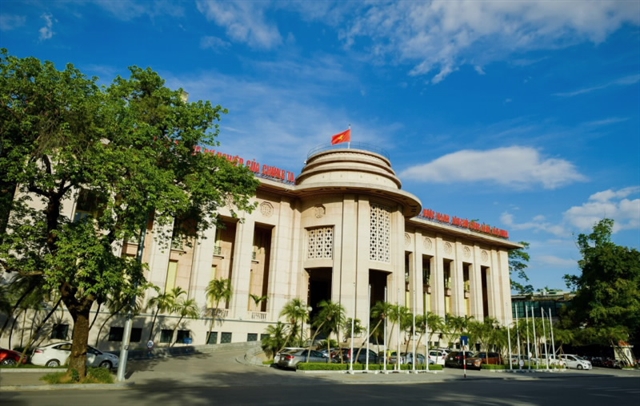 Economy
Economy

 |
| Headquarters of the State Bank of Vietnam in Hà Nội. Some experts believe the SBV can still cut the policy interest rate further as its current priority is to lower interest rates to promote credit growth and support economic growth. Photo sbv.gov.vn |
HÀ NỘI — Experts have different forecasts about the time when the State Bank of Vietnam (SBV) will lower its policy interest rate. While some experts expect the rate to decrease by 0.5-1 percentage point at the end of the third or fourth quarter of this year, others believe the rate will be kept unchanged.
According to some experts, although rising pressure on the foreign exchange rate and inflation are the main factors affecting the SBV's ability to continue lowering the policy rates in the remaining months of this year, the SBV can still cut the rate further as its current priority is to lower interest rates to promote credit growth and support economic growth.
Banking expert Nguyễn Trí Hiếu forecasts that deposit interest rates will continue to decrease in the remaining months of this year. However, he noted that the rate cannot decrease as significantly as at the beginning of the year because banks must ensure their profitable business performance. Moreover, if deposit interest rates drop sharply, it will be challenging for banks to compete with other investment channels in attracting idle money.
Regarding lending interest rates, Hiếu predicted it is difficult to reduce them significantly in line with deposit interest rates because they must also ensure the safety of the banking system.
In addition, Hiếu said the SBV’s potential further interest rate reduction would also depend on the world financial situation. If the US Federal Reserve (Fed) raises interest rates in September, it will be challenging for Việt Nam to significantly reduce interest rates. If the rates are reduced sharply, the Vietnamese đồng will depreciate sharply against the US dollar, which could create instability in the foreign exchange market.
Hiếu forecasts interest rates will further decrease by about 0.5 percentage point in the remaining months of this year.
Sharing the same opinion, economist Lê Duy Bình, CEO of Economica Vietnam, said it is difficult to expect the SBV to have strong and consecutive reductions in the policy interest rates in the last months of this year because VNĐ-denominated interest rates depend on interest rates in many major economies while the pressure to increase interest rates in the US and Europe has not completely cooled down.
Besides, the effects of interest rates on foreign exchange rate also need to be calculated and balanced, Bình said.
From a more optimistic perspective, expert PhD. Đinh Trọng Thịnh believes that interest rates from now until the end of the year will decrease significantly, by about 1.5-2 percentage points.
Some securities companies such as Yuanta Vietnam Securities Company also predict that the SBV will continually cut the policy interest rates by some 50 basis points right in the third quarter this year to promote the process of reducing deposit and lending interest rates at commercial banks.
On the contrary, some experts believe that it will not be necessary for the SBV to further reduce the policy interest rates this year.
Maybank Securities Company forecasts the SBV will keep policy interest rates unchanged instead of cutting further due to risks of exchange rate pressure in the context of rising US bond yields.
In addition, Maybank Securities Company said the SBV is also concerned that relying too much on loose monetary policy could lead to higher bad debt and instability in the banking system in the long term.
Sharing the same view, chief economist of BIDV Dr. Cấn Văn Lực said the policy interest rates should stay at a stable level as currently and it is not necessary to further lower the rate.
In a recent report, the World Bank (WB) warned that there is not much room left for Việt Nam to further loosen monetary policy. Credit demand continues to be low even though interest rates have decreased. Further interest rate cuts are unlikely to bring the desired effect to promote credit growth. Besides, Việt Nam’s further interest rate cut will increase the interest rate gap with global markets that potentially puts pressure on exchange rates.
Dr. Trần Hùng Sơn, lecturer at the University of Economics and Law under the HCM City National University, said if interest rates are further reduced, it will be still difficult to stimulate a sudden increase in credit demand. Notably, if interest rates are reduced too quickly, the difference between domestic and international interest rates will increase, especially with dollar-denominated interest rates. As the gap rises, pressure on the foreign exchange rate will be unavoidable.
Currently, experts and investors expect the Fed to keep interest rates unchanged at its September meeting. However, the risk of another interest rate hike in the last months of this year increases after the latest report showed US’s core inflation accelerated in August. In case the Fed still aggressively raises interest rates, the SBV may be more cautious and delay its policy rate cut until early 2024. — VNS




